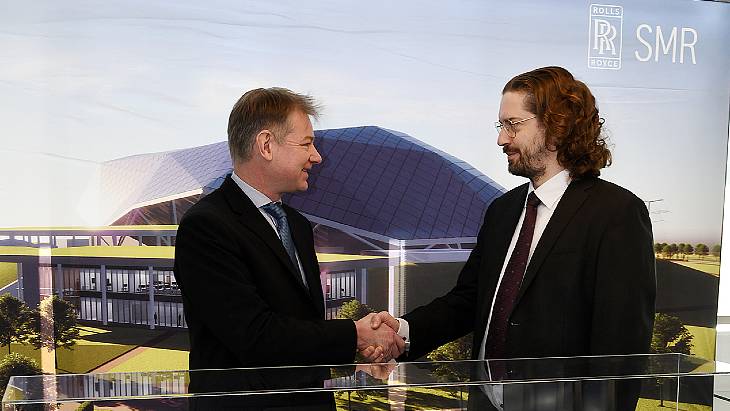Poland's Industria selects Rolls-Royce SMR for green energy plans
Rolls-Royce SMR and Polish group Industria have signed a Memorandum of Intent (MoI) to collaborate on deploying small modular reactors (SMRs) in the country.

Alan Woods, Rolls-Royce SMR’s Director of Strategy and Business Development, left, and Szczepan Ruman, CEO of Industria (Image: Rolls-Royce SMR)
Industria is state-owned, part of Industrial Development Agency JSC (IDA), and has selected the Rolls-Royce SMR for the Central Hydrogen Cluster, with plans to produce 50,000 tonnes of low-carbon hydrogen each year.
There could be "up to three" SMRs as part of the scheme to decarbonise the regional energy infrastructure. Rolls-Royce SMR said there may also be "opportunities to replace more than 8GW of coal-fired power plants in southern Poland with SMRs throughout the 2030s".
Rolls-Royce SMR CEO, Tom Samson, said the MoI was "an important step in our relationship with Industria - setting out the basis on which we’ll work together to develop joint plans for using our SMR technology in Poland to decarbonise energy-intensive industry and produce clean power for generations to come".
He added that Poland was one of its key international markets, saying "this partnership has enormous potential and could support thousands of high-skilled, long-term jobs in Poland and the UK - both directly and in the supply chain".
Cezariusz Lesisz, President of the Board of IDA, said: "Cooperation with Rolls-Royce SMR is a great opportunity for the Świętokrzyskie region and IDA’s capital group companies in developing a high-tech industrial base for small scale nuclear power in Poland.
"Building new competencies of Polish industry is part of a trend of focusing on energy transition and strengthening our country’s energy security and resilience. The Industrial Development Agency wants to support projects to transform energy intensive industry, which will be able to benefit from both renewables and nuclear energy, which will be available in Poland in the next decade or faster."
Szczepan Ruman, CEO of Industria, said: "Participation in a supply chain of parts and modules for Rolls-Royce SMR is a great opportunity for our region and for the entire industry in southern Poland - which has built all the existing Polish power plants.
"With the support of IDA Group, we aim to create jobs and secure Polish industry’s strong participation in the SMR industry of the future. Central Hydrogen Cluster and the hydrogen valleys’ (Lower Silesia, Silesia-Lesser Poland and Subcarpathian) aim is to secure clean energy sources for grid, industry and clean hydrogen production. Plans for deployment of Rolls-Royce SMR power plants in central and southern Poland will help meet these goals in the 2030s."
The Rolls-Royce SMR is a 470 MWe design based on a small pressurised water reactor, with the company hoping to get the first one online in the UK by the end of the decade.
Poland is in the process of a large-scale switch towards nuclear energy as part of its decarbonisation plans. Its government last year selected Westinghouse's AP1000 for the first part of the country's six-reactor plan to build up to 9 GWe capacity by 2040 and South Korean's Korea Hydro & Nuclear Power has agreed a separate plan for a nuclear power plant in Patnow with Polish companies ZE PAK and Polska Grupa Energetyczna.
There are also various initiatives to bring SMRs to Poland, at various stages of progress. Last week PKN Orlen said it was preparing to announce locations for up to 79 GE Hitachi Nuclear Energy BWRX-300 SMRs. EDF last month signed an agreement with Respect Energy about developing nuclear power projects based on the Nuward SMR technology. In July 2022, copper and silver producer KGHM Polska Miedz SA submitted an application to Poland's National Atomic Energy Agency for assessment of NuScale's VOYGR SMR power plant. KGHM says its aim is to deploy a first NuScale VOYGR SMR power plant in Poland as early as 2029.
Researched and written by World Nuclear News
- China Institute of Atomic Energy
- Nuclear Power Institute of China
- Southwestern Institute of Physics
- China Nuclear Power Operation Technology Corporation, Ltd.
- China Nuclear Power Engineering Co., Ltd.
- China Institute for Radiation Protection
- Beijing Research Institute of Uranium Geology (BRIUG)
- China Institute of Nuclear Industry Strategy (CINIS)
- China Nuclear Mining Science and Technology Corporation


